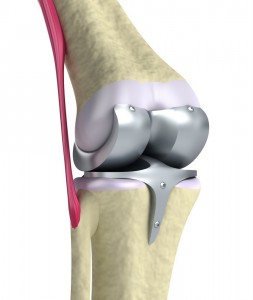Prosthesis

The joint replacement surgery, o artroplastia, is a surgical procedure that involves removing a damaged joint and a prosthesis, the artificial joint, in his stead. In some cases, entire joint is not removed, but replacing the damaged parts only.
Joint replacement surgery can relieve pain and help patients improve mobility and feel better. The hip and knee joints are most often replaced, but they are not the only ones that can be replaced. Arthroplasties are also performed to replace the shoulder, finger joints, ankle and elbow.
La artificial joint, which is technically called prosthetic, Plastic is, of metal or of both materials and can be fixed with or without cement, so that the whole bone can grow into the prosthesis. In some cases, both methods are combined to fix the joint in place.
Prostheses have a limited life, between 15 and 20 years old. Depending on the age of the patient, prosthesis should be changed more than once throughout his life.
When Is joint replacement?
A joint replacement is often the only solution if you suffer constant pain and can not develop proper joint movement. Only the doctor can tell if you need an artificial joint. Prescribe the necessary diagnostic tests (imagery, Arthroscopy, examination of TEJIDOS), and can advise on non-surgical treatments (exercise, physiotherapy, medication).
FAQ
- When is indicated joint replacement?
Call your orthopedic surgeon. He will tell you when the joint replacement is the best option for you.
- Does the prosthesis implanted me who is forever?
Not, each prosthesis has a different duration. The duration of a prosthesis between the 15 and 20 years old
- How often should I check the prosthesis?
See your orthopedic surgeon periodically to review the joint and the state of the prosthesis. Generally once a year is enough.
- If the extensor mechanism of the knee is injured after implantation of a prosthesis, Is there any solution?
Yes, You can practice a transplant or allograft extensor extensor apparatus. Dr. Andrew Camprodon is one of the
few specialists in this surgery
Before implantation of the prosthesis
From the moment you and your doctor have decided to undergo a surgery where they replace the joint with a prosthesis, need time to prepare, both physically and emotionally. This process, can favor the successful operation and a speedy recovery.
- Talk to your doctor, never hesitate to ask what you do not understand or convey their doubts and fears.
- The more you know about the process that is to be subjected, better able to handle the changes that generate joint replacement surgery in your life.
- Before surgery, their status will be checked for general health, you have blood tests, an electrocardiogram and radiographs. If you have had any problems with anesthesia in the past, explain it to your doctor.
- You might suggest that you donate blood, why you may need it at the time of the intervention.
- Ask your doctor what the duration of their stay in hospital, how long recovery, and if you can fend for yourself or need the assistance of another person or crutches.
- The doctor will tell you if you need physical therapy and who may attend. Too often we forget to ask things we wanted to consult the doctor. It is best to make a list (What are the results and complications of this surgery?, Is it painful? How will my level of activity after joint replacement?
- Si fuma, reduce the amount of cigarettes or quit smoking, as delayed recovery and smoking can interfere with the anesthesia.
- Eat a balanced diet. If you are overweight, it may be advised to lose weight to reduce the force that will have to support your new hip or knee.
- Exercise, as directed by the surgeon or physical therapist. It can strengthen the upper body to better handle crutches if you go to need it.
- It is advisable to start with postoperative exercises accustomed to going to have to make in your recovery, if you already know, it is easier to execute after surgery.
- Moderate consumption of alcoholic beverages. Do not drink any alcohol from midnight before surgery. Tell your doctor if you use any narcotic or drug, since they can affect the operation.
- Anticipate what people are going to help. Dfter surgery their mobility and autonomy will be reduced; others will need to perform tasks that you performed. You only live, is convenient to have someone accompany you home and stay with you for several days after surgery. Another option is to hire someone to help you at home. Consider joining a specialized center once it is discharged. Social workers or hospital staff can help.
- Prepare your home for when you return from hospital: consider the possibility of moving some furniture or changing site and installed in another room; Keep carpets, and make sure there are no electrical wires on the ground or other elements that can be tripped.
- Prepare the bathroom to make it more comfortable and safe (shower chair, bar to hold, raised toilet seat).
- Envision if you need crutches, walker, Pillows, shoehorn or other aid.
After implantation of the prosthesis
- You will feel some side effects, may feel discomfort, pain, swelling or inflammation in the area of the wound.
- Strictly follow the guidelines of your rehabilitation program immediately and consult any questions or problems you have.
- There may be complications: infections, excessive bleeding, reaction to anesthesia or accidental injury. Certain people are more at risk of complications due to medical conditions.
